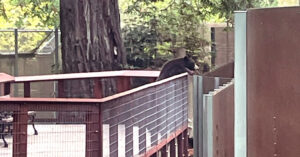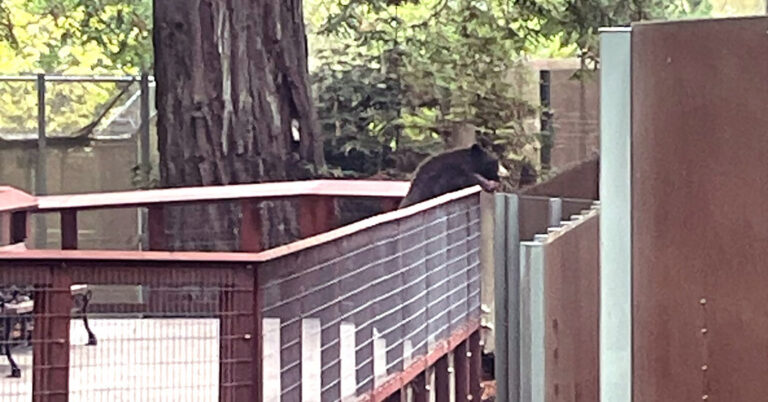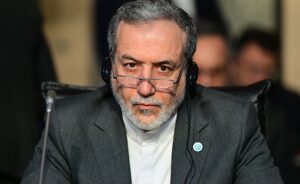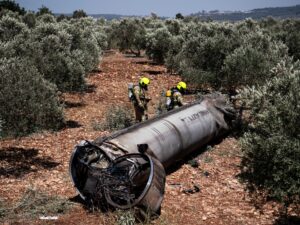From 1h ago
US bombing of Iran a ‘blatant breach of international law’, Greens leader says
The US bombing of Iran represents a “fundamental threat to world peace” and Australia must distance itself from the attack, leader of the Greens Larissa Waters said.
In a statement published on Sunday, Waters said Australia cannot allow itself to be dragged into “another brutal US war in the Middle East” and said the US strikes were a “blatant breach of international law”.
Waters said the escalation was a “terrifying and catastrophic escalation by the USA, and Australia must condemn it.”
From Iraq to Afghanistan, we have seen Australia follow the US into devastating and brutal wars that have done untold damage to the people of the Middle East. We know that you cannot bomb your way to peace.
Australia must always work for peace and de-escalation. Australia is not powerless, and we cannot be involved in another brutal war in the Middle East.
Australia must take this opportunity to get out of Aukus, have an independent foreign policy that centres peace, and must not allow the use of Australian US military bases like Pine Gap in this conflict.
Only when countries like Australia push back and hold to principles and international law and back them up with material actions, will there be a chance for peace.
Senator David Shoebridge, Greens spokesperson on defence and foreign affairs, said the world was “at a crossroads” and “the Albanese government must choose to be a force for peace not for war”.
With US president Trump’s bombing of Iran showing clearly that he is no friend of peace, and the Albanese government must distance Australia from these actions.
Share
Updated at 03.47 CEST
Key events
Show key events only
Please turn on JavaScript to use this feature
Dan Jervis-Bardy
Bruce Wolpe, a senior fellow at the United States Studies Centre, said Trump’s public remarks confirming the strikes on Iran were the “toughest” statement a US president had made towards an enemy since 9/11.
Wolpe said:
Trump’s message was unyielding and decisive. Stop your attacks on Israel, or we will come back, stop your nuclear program, or we will come back.
Wolpe is a former staffer to Julia Gillard who also worked with the Democrats during US president Barack Obama’s first term.
He said an escalation in the conflict would have “indirect but serious” consequences for Australia, with any potential closure to the Strait of Hormuz to have major economic implications globally.
Wolpe said the best thing Australia could do was encourage Iran to return to the negotiating table and to stop its acts of aggression against Israel.
Asked if sending troops to the region should be considered, he said: “Goodness no”.
I think the best message right now is to tell Iran to stop and conduct diplomacy.
Share
Former Australian prime minister Scott Morrison has also dismissed any comparison between the US strikes against Iran and the Bush Administration’s unilateral invasion of Iraq suggesting the attack on Sunday was a “very clear strike with very specific purposes”.
I understand the argument made between trying to draw equivalence between this and actions in Iraq. I suspect that won’t be the case here.
Morrison said there’s no suggestion the US will be sending in”any sort of ground force or anything of that nature”.
As a result, I think the two are very different and I don’t think there’s anything at this point in time to suggest any equivalence these two events.
Asked about what he thought Australia’s role should be going forward, Morrison said Australia’s national interests were aligned with the US “on questions of the Indo-Pacific and particularly the Taiwan Straits”.
Australia should act in terms of its national interests.
Share
Updated at 04.39 CEST
‘It’s time to end this’: Scott Morrison backs strikes on Iran
The US president, Donald Trump, had “no further options” other than to strike Iran and that the country must now “lay down their arms” by giving up their nuclear program, former Australian prime minister Scott Morrison says.
Speaking to ABC news on Sunday, Morrison said that “only the US military” could strike Iran’s nuclear program. Morrison defended Trump, saying that he had not “rushed towards” a decision.
He has been resolute about the need to resolve this issue and that was only going to occur with what we’ve seen today. Now, with that action, I think it is still contained. It was very direct in where they struck, and the message he has sent clearly to the regime is the ball is very much in their court. And it’s time to end this. And to move towards a peace.
Morrison has said the decision was taken through his “peace through strength” initiative, a phrase that has also been used by the Israeli prime minister, Benjamin Netanyahu.
He said that while Israel wants regime change in Iran, the US wants Iran to return “to the table now and completing what would be an unconditional arrangement when it comes to their nuclear facilities”.
There was no roadmap to peace before. There was none. Iran, you can’t negotiate with an authoritarian regime like Iran.
Asked about Iran’s repeated efforts to negotiate, and no clear evidence from the US intelligence community or other authorities that there was evidence Iran was close to building a nuclear weapon, Morrison said Iran’s intent is “well known”.
It’s not a risk we were prepared to take, with an authoritarian regime who says it wants to vaporise the state of Israel.
Following his electoral defeat in 2022, Morrison was considered Australia’s most unpopular prime minister since 1987.
Share
Updated at 04.52 CEST
US strikes against Iran ‘spectacular military success’: Trump
US president Donald Trump has declared mission accomplished in his address to Americans, describing strikes against three Iranian nuclear facilities as a “spectacular military success” carried out in close collaboration with the Israeli prime minister, Benjamin Netanyahu.
I can report to the world the strikes were a spectacular military success. Iran’s key nuclear enrichment facilities have been completely and totally obliterated. Iran, the bully of the Middle East, must now make peace. If they do not, future attacks will be far greater and a lot easier.
Trump also pledged further US strikes “if peace does not come quickly”.
For more on this developing story, head over to the Guardian’s Israel-Iran war live blog for the blow by blow:
Share
Updated at 04.53 CEST
Israel fighting to maintain ‘monopoly on the possession of these weapons of mass destruction’, analyst says
Responding to questions about whether US strikes against Iran will end its nuclear program, analyst Mouin Rabbani said that, unlike Israel, Iran was a signatory to the nuclear non-proliferation treaty since 2015 and had been complying with requirements as part of its obligations.
He said a change of course by Iran followed a decision by the first Trump administration to rip up an earlier deal over the future of its nuclear program in 2018 that it changed.
I think it’s also important with all this talk about the Iranian nuclear weapon, which should, of course, be discussed. We often forget Iran is not a nuclear power. It is a nuclear threshold state. There is only one nuclear power in the Middle East, and that is Israel. And Israel is fighting this war very much to maintain its monopoly on the possession of these weapons of mass destruction in the Middle East.
Rabbani said that striking the Iranian nuclear program is not enough to end the program as the knowledge of how to construct the weapon remained. He added that the attacks are likely to create internal pressure within Iran for the regime to acquire nuclear weapons to defend itself.
On the prospect of Iranian retaliation, Rabbani said there were more questions than answers.
One thing that has distinguished the Iranians over the years is that they tend to act strategically rather than impulsively.
Share
Updated at 04.07 CEST
Trump to address the nation
The US president, Donald Trump, will shortly address Americans following his decision to enter Israel’s war with Iran by striking three nuclear sites in the country overnight.
For the blow-by-blow, follow The Guardian’s Israel-Iran war live blog:
Share
Updated at 04.03 CEST
Iran could retaliate by disrupting oil supplies, analyst says
The Iranian response to US strikes on its nuclear facilities will depend on whether the attacks were as successful as Trump claims, an analyst says.
Speaking to ABC news, analyst Mouin Rabbani said what happens next will depend on whether Iran directs its anger at Israel, or the US. The scale of the damage, he said, may create an incentive for Iran to close the Strait of Hormuz in the Red Sea and seek to block the Bab Al-Manab to disrupt global oil and gas supplies.
Yes, Iran would be shooting itself in the foot. And yes, arguably the main immediate victim would be China, which is a main importer of Gulf energy. But the Iranians, looking at the virtual civil war within the US Republican party, may conclude that sending gas prices at the pump in the United States at the height of the summer holidays would be the most appropriate response.
They could also, you know, decide to begin systematically hitting US facilities throughout the Middle East, either directly or in co-ordination with their coalition partners in the so-called Axis of Resistance.
Rabbani said, in the context of an escalation by Israel and a direct strike on its facilities by the US, he would be “extraordinarily surprised” if Iran were to respond to the attack on its nuclear facilities by re-entering negotiations.
I think one thing we can exclude is seeing American and Iranian diplomats sitting around the negotiating table later this week.
Share
Updated at 03.54 CEST
US bombing of Iran a ‘blatant breach of international law’, Greens leader says
The US bombing of Iran represents a “fundamental threat to world peace” and Australia must distance itself from the attack, leader of the Greens Larissa Waters said.
In a statement published on Sunday, Waters said Australia cannot allow itself to be dragged into “another brutal US war in the Middle East” and said the US strikes were a “blatant breach of international law”.
Waters said the escalation was a “terrifying and catastrophic escalation by the USA, and Australia must condemn it.”
From Iraq to Afghanistan, we have seen Australia follow the US into devastating and brutal wars that have done untold damage to the people of the Middle East. We know that you cannot bomb your way to peace.
Australia must always work for peace and de-escalation. Australia is not powerless, and we cannot be involved in another brutal war in the Middle East.
Australia must take this opportunity to get out of Aukus, have an independent foreign policy that centres peace, and must not allow the use of Australian US military bases like Pine Gap in this conflict.
Only when countries like Australia push back and hold to principles and international law and back them up with material actions, will there be a chance for peace.
Senator David Shoebridge, Greens spokesperson on defence and foreign affairs, said the world was “at a crossroads” and “the Albanese government must choose to be a force for peace not for war”.
With US president Trump’s bombing of Iran showing clearly that he is no friend of peace, and the Albanese government must distance Australia from these actions.
Share
Updated at 03.47 CEST
‘Virtually impossible’ to argue US strikes legal under international law, expert says
Dan Jervis-Bardy
The international law expert Donald Rothwell said it was “virtually impossible” to mount a case that the US’s reported strikes on Iranian nuclear sites were legal under international law.
Under article 51 of the UN charter, states are allowed to use force to defend themselves from an armed attack.
International law experts argue the charter does not provide a broader right to pre-emptive attacks, such as the strikes Israel launched on Iran on 13 June on the grounds of eliminating Tehran’s nuclear threat.
Rothwell, a professor at the Australian National University, said given there had been no direct threat from Iran towards the US then Trump’s reported attack could not be justified.
He told Guardian Australia:
It’s virtually impossible, I think, for the United States to mount any credible legal argument [for the strikes] on that basis.
Rothwell said the US attacks could set a precedent for how other countries could use the self-defence argument as cover for pre-emptive attacks.
The really concerning aspect of this is the precedent it sets. If the United States can do this, and this is a precedent that the United States is taking in terms of its interpretation of self defence, or the way in which you can use force, then other states will take that into account in terms of how they consider their own future conduct.
Share
Updated at 03.39 CEST
Dan Jervis-Bardy
Deputy PM won’t be drawn on Iran’s nuclear capabilities
Speaking to Sky News earlier, the defence minister, Richard Marles, was asked about reports the US has pre-positioned B-2 bombers as Donald Trump weighs up whether to launch an attack on Iran’s nuclear facilities.
The deputy prime minister was asked if such an attack would be justified.
Marles responded:
I’m not about to speculate on what the United States does. The position that we have articulated in relation to this conflict has been consistent from the outset, and that is that we are worried about the prospect for escalation.
We continue to do that, saying that we obviously recognise Israel’s right to defend itself, we very much acknowledge the risk that the Iranian ballistic missile program represents.
That two-part response – calling for de-escalation while referencing Israel’s right to defend itself – is the standard line that Marles and other senior ministers have used when asked about the conflict in recent days.
While Marles referenced the threat of Iran’s nuclear ballistic program, he refused to be drawn on whether he thinks Tehran is actually close to having a nuclear weapon.
I’m not about to speculate on that, other than to say what I already have, and that is that the Iranian nuclear ballistic missile program is most definitely a threat to peace and stability of not only the Middle East, but the world.
Share
Updated at 03.02 CEST
Iran situation still unclear
The situation surrounding the US strikes on Iran is unclear making it difficult to understand what has taken placed, a retired US army officer John Spencer.
Speaking with the ABC on Sunday morning, John Spencer an analyst with the Urban Warfare Institute says the number of bombs dropped are currently unknown, as are the specific targets. For example, he said, Fordow is not one site but “multiple sites”.
Spencer added that the goal of the US, for now, is not regime change but about achieving political objectives.
It looks like the United States said ‘we can help Israel speed to this along, and achieve limited objectives’. And I have some disagreements in comparing this to either the first Gulf War or the invasion of Iraq, this is about setting back Iran’s nuclear program and enforcing a political agreement, much like what was done in Iraq in the 1980s.
We will bring you the latest as Australia responds to this development. For more on these unfolding events, head over to The Guardian’s Israel-Iran war live blog:
Share
Updated at 03.15 CEST
US President Donald Trump has announced he will address the American public at 10pm in Washington DC, which is midday on Australia’s east coast.
In a statement to social media, Trump said:
I will be giving an Address to the Nation at 10:00 P.M., at the White House, regarding our very successful military operation in Iran. This is an HISTORIC MOMENT FOR THE UNITED STATES OF AMERICA, ISRAEL, AND THE WORLD. IRAN MUST NOW AGREE TO END THIS WAR. THANK YOU!
For more on these unfolding events, head over to the Guardian’s Israel-Iran war live blog:
Share
Updated at 03.02 CEST
From a rectal kit to a Berlin Wall-era transmitter: the artefacts of Australia’s spy museum which doesn’t exist – yet
Every morning Mike Pritchard eats breakfast next to a Stasi surveillance rack. The machine, sitting on a couple of milk crates near his dining room table, is composed of colour-coded buttons, switches and dials. It contains a surveillance receiver, a controller for up to 10 receivers, a reel-to-reel tape recorder, and a numbers-station broadcast box.
The equipment in this rack can be seen in the German film The Lives of Others. It’s absolutely been used. They used this stuff every day. Remember, this was a police state – they are using this stuff to listen to everybody. This is not a once-a-month thing, it’s your day job.
The artefact is not the only piece of espionage history in his home. He has spy cameras once favoured by intelligences services such as the CIA and KGB and a field radio used in the second world war by US women parachuted in behind enemy lines.
The really interesting things he keeps off-site in a facility that is packed to the brim – like cipher devices used by the French intelligence services during the Algerian civil war and in Indochina that were once uncrackable; several working enigma machines; a briefcase built to conceal a compact automatic firearm; a bra built to conceal a hidden camera; a rubber stamp from a Berlin Wall checkpoint; and a nameless device built to detect invisible writing.
The truth is, I think I am a complete nerd.
For more on this story, read the full feature below:
Share
US strikes three nuclear sites in Iran
US President Donald Trump has announced that the US has carried out strikes against three Iranian nuclear facilities.
In a post to social media website, TruthSocial, the US president said a “very successful attack” had been carried out on three nuclear sites in Iran: Fordow, Natanz and Esfahan.
We have completed our very successful attack on the three Nuclear sites in Iran, including Fordow, Natanz, and Esfahan. All planes are now outside of Iran air space. A full payload of BOMBS was dropped on the primary site, Fordow. All planes are safely on their way home. Congratulations to our great American Warriors. There is not another military in the World that could have done this. NOW IS THE TIME FOR PEACE! Thank you for your attention to this matter.
The news comes after the US moved B-2 stealth bombers to airbases in Guam and despite statements by Trump that he would give Iran two weeks to negotiate before he decided whether the US would join the conflict.
Share
Updated at 02.11 CEST
Hastie also flagged a break from the party line under previous Coalition leader Peter Dutton, saying Australia should be willing to serve as part of a peacekeeping force in Ukraine saying, “my personal view is we should have left it open”.
My view is that we should consider an offer and respond to one. That would be a decision taken by the prime minister and the national security committee. That’s something that you would do at the time. I don’t think we should be ruling in or out troops to Ukraine. I want to be clear. It would be a very specialised deployment. We have Special Operations for a reason. A small element. I don’t think it’s wise to rule in or out Australian troops, particularly for peace-keeping or peace-monitoring roles.”
Hastie criticised the prime minister for agreeing to participate, and the former Coalition leader for refusing to participate without waiting to “consider the merits of the request at the time”.
That is still my position. Australian state-craft, we should be responsive to the situation and not wedded to a position through ideology or through preconceived notions of what things could look like.
Share
Updated at 01.51 CEST











